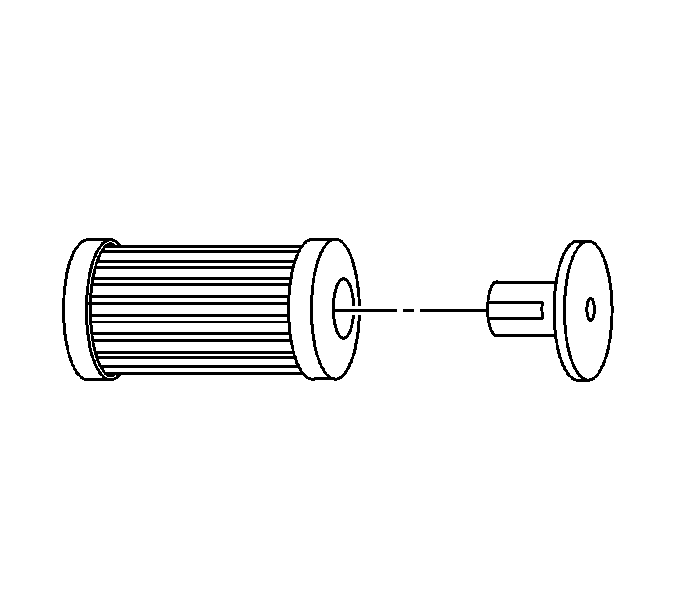Important: Warmer engine or ambient temperature decreases the refrigerant recovery
time during the A/C flush procedure.
- Recover the refrigerant. Refer to
Refrigerant Recovery and Recharging
.
- Remove the orifice tube. Refer to
Expansion (Orifice) Tube Replacement
.
- Connect the A/C lines with the orifice tube removed.
- Remove the A/C compressor. Refer to
Air Conditioning Compressor Replacement
.
- Install the J 45268-3 to the A/C compressor hose
assembly.

- Forward flow refrigerant
flushing is recommended for contaminated refrigerant or PAG oil.
Perform the following procedure:
| | Important: The filter inside the J 45268-1 is serviceable. Remove
and discard the check valve from the filter.
|
| 6.1. | Service the filter with AC P/N GF 470, before each flush. |
Connect the J 45268-1 flush filter to the suction port of
the J 45268-3 flush adapter.
| 6.2. | Connect the blue hose from the J 43600
to the J 45268-1 flush filter adapter. |
| 6.3. | Connect the red hose from the J 43600
to the J 45268-3. |
- Reverse flow refrigerant flushing is recommended for desiccant
bag failure only.
Perform the following procedure and replace
the accumulator when the flush is complete:
| | Important: The filter inside the J 45268-1 is serviceable. Remove
and discard the check valve from the filter.
|
| 7.1. | Service the filter with AC P/N GF 470, before each flush. |
Connect the J 45268-1 flush filter to the discharge port of
the J 45268-3 flush adapter.
| 7.2. | Connect the blue hose from the J 43600
to the J 45268-1 flush filter adapter. |
| 7.3. | Connect the red hose from the J 43600
to the suction port of the J 45268-3. |
- Flush the A/C system. Follow the instructions supplied with the J 43600
.
Close the
valve on the external refrigerant tank, before starting the flush process.
Notice: Use the correct fastener in the correct location. Replacement fasteners
must be the correct part number for that application. Fasteners requiring
replacement or fasteners requiring the use of thread locking compound or sealant
are identified in the service procedure. Do not use paints, lubricants, or
corrosion inhibitors on fasteners or fastener joint surfaces unless specified.
These coatings affect fastener torque and joint clamping force and may damage
the fastener. Use the correct tightening sequence and specifications when
installing fasteners in order to avoid damage to parts and systems.
- Remove the J 45268-3 from the A/C compressor hose assembly.
| • | Remove the A/C compressor drain plug. |
| • | Drain the PAG oil from the A/C compressor. |
| • | Rotate
the compressor input shaft to assist in draining the PAG oil from the compressor. |
| • | Install the A/C compressor drain plug. |
Tighten
Tighten the drain plug to 20 N·m (15 lb ft).
- Install the A/C compressor. Refer to
Air Conditioning Compressor Replacement
.
- Inspect the orifice tube for debris.
Clean or replace
as needed.
- Install the orifice tube. Refer to
Expansion (Orifice) Tube Replacement
.
- Evacuate and recharge the A/C system. Refer to
Refrigerant Recovery and Recharging
.
Important: Flushing will remove all the PAG oil from the A/C system.
- Add the total system capacity of PAG oil to the A/C system. Refer to
Refrigerant System Capacities
.
Important: Flushing will remove the fluorescent leak detection dye from the A/C
system.
- Add one bottle of J 41447
using the J 41459
.
- Leak test the fittings using the J 42220
.

